wearing fashionable suits vs wearing casual clothing
Wearing fashionable suits vs. wearing casual clothing
Wearing fashion suits versus casual clothing can influence various aspects of our lives, affecting how we think, feel, and behave in different situations. It's important to note that individual preferences, cultural norms, and situational contexts play a significant role in how clothing choices must be made.
Ultimately, the key is to strike a balance between personal comfort, self-expression, and appropriateness for the given context or occasion. Both suits and casual clothing have their psychological implications, and the choice depends on factors such as personal style, professional requirements, and desired psychological effects. to shop stylish suits for men Click Here.
Confidence and Authority: Wearing a suit, especially stylish suit for men, is often associated with professionalism, authority, and a sense of command. The structured design, crisp lines, and formal appearance of suits can make individuals feel more confident and assertive, particularly in formal or professional settings. The psychological phenomenon known as "enclothed cognition" suggests that the clothes we wear can influence our cognitive processes and behavior, including feelings of confidence and authority. When wearing a stylish suit, individuals may adopt a more serious, focused mindset that enhances their sense of authority and presence. One reason maybe because coats have military background. and has crisp and well discipline outline and silhouette.
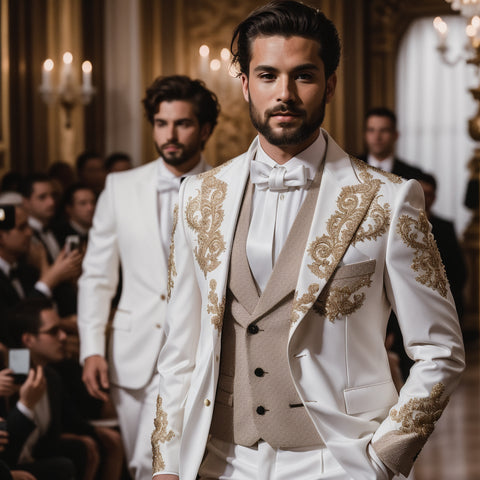
Stylish suits for men
On the other hand, casual clothing, while comfortable and relaxed, may not convey the same level of authority or command. Casual attire, such as t-shirts, jeans, and sneakers, is often associated with informal or leisurely settings where comfort and relaxation and personal expression are prioritized over formality. While casual clothing can promote a sense of ease and informality, it may not instill the same level of confidence and authority as wearing a man suit fashion.
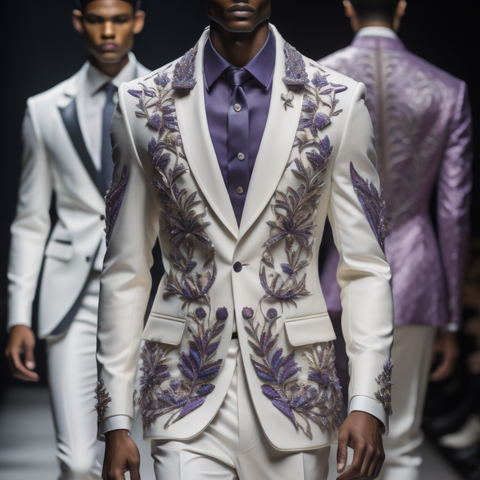
Man suit fashion
In professional or formal environments, wearing a suit can signal to others that you take your role seriously, command respect, and are capable of handling important responsibilities. It can also influence how others perceive your competence, credibility, and leadership qualities. As a result, wearing a suit can boost feelings of confidence, self-assurance, and authority, leading to more assertive and impactful behavior in professional interactions.
Comfort and Relaxation: When it comes to comfort and relaxation, there is often a noticeable difference between wearing properly fitted suit and wearing casual clothing.
Mens suits, especially traditional ones known as classic suits for men made with structured coat fabrics like wool or blends, can sometimes be less comfortable than casual clothing. The tailored fit and formal design of suits, including elements like fitted jackets, buttoned shirts, and dress shoes, can feel restrictive and may not allow for as much freedom of movement as casual attire. Typically, people wear suits with additional layers like ties and belts, exacerbating the feeling of constriction.

Classic suits for men, Black with white ruffle shirt
Conversely, people typically choose casual clothing for its comfort and ease of wear. Fabrics used in casual attire, such as cotton, linen, or blends, are often softer, more breathable, and less rigid than those used in suits. Designers design casual clothing styles like t-shirts, jeans, shorts, and sneakers with comfort in mind, enabling more relaxed movements and a sense of freedom.
In terms of relaxation, casual clothing tends to promote a more laid-back and easygoing vibe. Leisure activities, downtime, and informal social 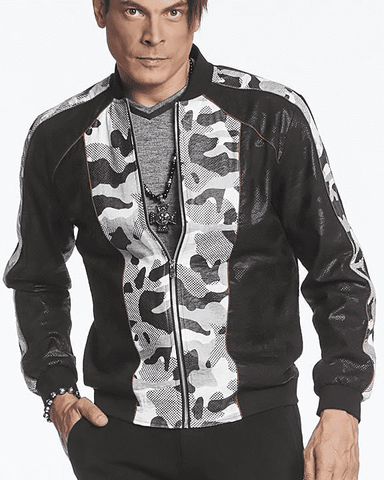
Men casual clothing, sportive outfit
settings often associate casual clothing with prioritizing comfort. Wearing casual clothing can signal to the mind and body that it's time to unwind, relax, and enjoy a more relaxed pace.
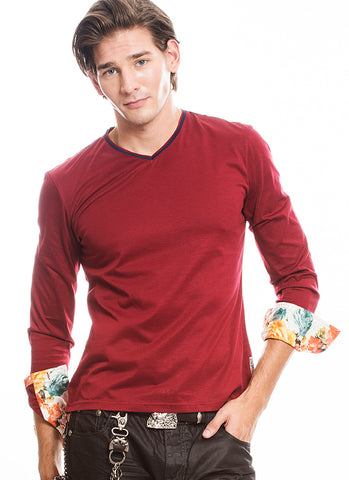
Casual outfit Jeans and long sleeve t shirt
However, it's important to note that comfort and relaxation are subjective and can vary depending on personal preferences, body type, and the specific design and fit of clothing items. Certain types of suits or tailored clothing, especially those made from lightweight, stretch, or performance fabrics designed for mobility and comfort, may provide comfort to some individuals.
Self-expression: Choosing between wearing suits and casual clothing can significantly impact self-expression. Suits, with their tailored cuts, structured designs, and formal aesthetic, often project a sense of professionalism, authority, and adherence to traditional norms. While they can convey a polished and sophisticated image, they may limit opportunities for personal expression and creativity. On the other hand, casual clothing offers a wide range of options for self-expression.
From graphic t-shirts and jeans to athleisure wear and streetwear-inspired outfits, casual attire allows individuals to showcase their personalities, interests, and unique style preferences. Casual clothing promotes a more relaxed and authentic form of self-expression, allowing individuals to experiment with different looks, colors, patterns, and accessories to create outfits that reflect their individuality and lifestyle. Ultimately, individuals choose between suits and casual clothing for self-expression based on their personal style preferences, the desired image, and the context in which they wear the clothing.
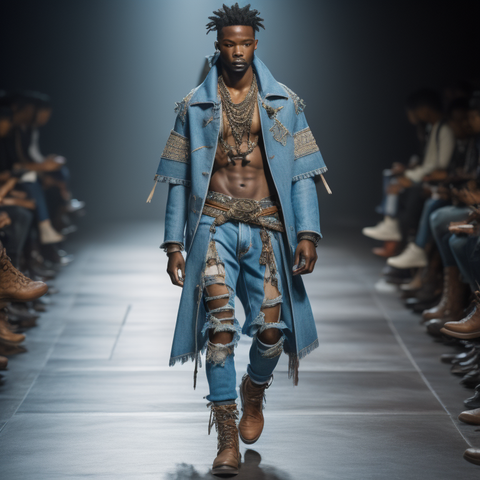
Streetwear clothing,
Mood and motivations: The choice between wearing suits for men and casual clothing can have a notable impact on mood and motivation. The formal and structured design of mens suits often fosters a mindset that prioritizes focus, professionalism, and goal-oriented tasks. The act of dressing in a suit can serve as a psychological cue that primes individuals for work-related responsibilities, important meetings, or formal occasions. This can lead to a heightened sense of motivation, confidence, and a serious, business-minded approach to the tasks at hand. Shop mens stylish suits Go Here.
On the other hand, casual clothing tends to promote a more relaxed and laid-back mood. Comfortable fabrics, loose fits, and casual styles can evoke feelings of ease, comfort, and a desire for leisurely activities or socializing. While this relaxed mood can be beneficial for unwinding or enjoying downtime, it may not always align with the focus and drive required for professional or formal settings. Ultimately, the choice between suits and casual clothing for mood and motivation depends on the desired mindset, tasks at hand, and personal comfort preferences.
Summary
Wearing suits and casual clothing can significantly impact our lives, affecting how we think, feel, and behave in different situations. Both styles have psychological implications, and the choice depends on factors such as personal style, professional requirements, and desired psychological effects.
Confidence and authority are often associated with wearing fashionable suits. They can make individuals feel more serious and assertive, particularly in formal or professional settings. The psychological phenomenon known as "enclothed cognition" suggests that the clothes we wear can influence our cognitive processes and behavior, including feelings of confidence and authority.
In professional or formal environments, wearing a fashion suit can signal to others that you take your role seriously, command respect, and are capable of handling important responsibilities. It can also influence how others perceive your competence, credibility, and leadership qualities.
Comfort and relaxation are another significant factor when choosing between wearing suits or casual clothing. Fashion suits, have constructed Jacket made from fabrics like wool or blends, can sometimes be less comfortable especially if is not made to your body measurements than casual outfite. Casual attire, on the other hand, is often designed for its comfort and ease of wear, enabling more relaxed movements and a sense of freedom.
Self-expression is another important aspect to consider when choosing between suits and casual clothing. Suits can project a sense of professionalism, authority, and adherence to traditional norms, while casual attire offers a wide range of options for self-expression.
Mood and motivation are also influenced by the choice between wearing stylish suits and casual attire. Suits can foster a mindset that prioritizes focus, professionalism, and goal-oriented tasks, while casual attire promotes a more relaxed and laid-back mood.
Really enjoyed reading this — your points are not only thoughtful but also quite relevant in today’s world of fashion and lifestyle. As someone who follows brands like [Your Clothing Brand], I can relate to the ideas you’ve shared here. Looking forward to seeing more content like this
https://www.etsy.com/in-en/shop/gmapparelsin
Leave a comment